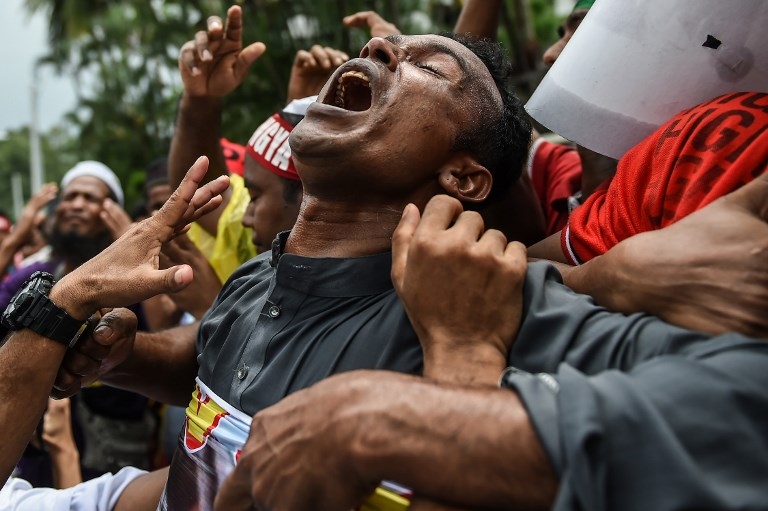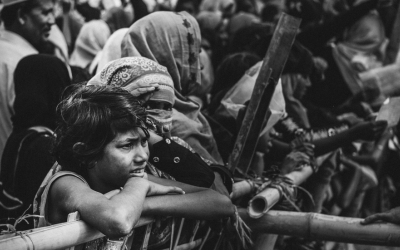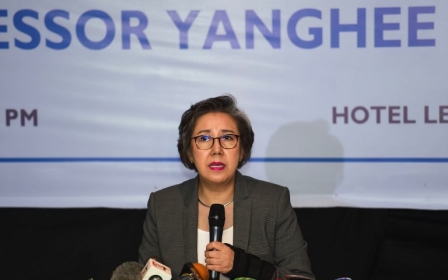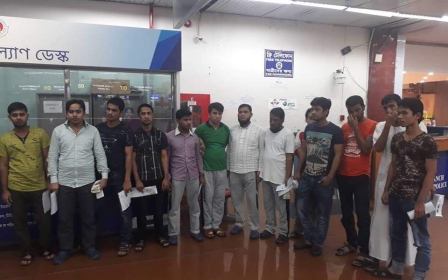Rohingya activists bemoan failure of Muslim countries to address Myanmar crisis

Muslim-majority countries continue to prioritise economic interests over the rights and lives of the Rohingya-Muslim minority facing an ongoing genocide in Myanmar, activists and other attendees at an historic international conference in New York have told Middle East Eye.
Speaking on Saturday on the sidelines of the event at Barnard College, Rohingya activists, responding to the latest round of Saudi deportations of Rohingya as reported by MEE on Friday, said leaders of Muslim-majority countries had not demonstrated a political will to help put a stop to the persecution of the Rohingya.
Last week's deportations follow the repatriation of 13 Rohingya from Riyadh to Dhaka in January.
Those deported were subsequently imprisoned in Bangladesh, drawing the ire of Amnesty International and the UN Special Rapporteur on human rights in Myanmar, Yanghee Lee. In a press briefing last month, Lee urged the governments of India and Saudi Arabia - both of whom have deported Rohingya to Bangladesh in recent months - to refrain from doing so.
Raiss Tinmaung, a Rohingya activist based in Canada, said that he could not understand why the kingdom would return a dozen persecuted, oppressed individuals to Bangladesh.
“What difference does it make to keep a dozen more people in your country? But then what can I expect from a country like Saudi Arabia that murders its own people, and is currently killing children in Yemen,” the 37-year-old Tinmaung told MEE.
“We have to accept that dollars are a lot more important than concern for the so-called Muslim world.”
Organised by the Free Rohingya Coalition, “The international conference on protection and accountability in Burma,” primarily focused on the question of justice and the prospects of accountability, after Myanmar's military-led offensive in northwestern Rakhine state left thousands dead and uprooted almost a million Rohingya in 2017.
The two-day conference, attended by activists, scholars and legal experts, also saw prominent messages of solidarity and support from Lee, the UN Special Reporteur on human rights, and US civil rights activist Angela Davis.
'But then what can I expect from a country like Saudi Arabia that murders its own people, and is currently killing children in Yemen'
- Raiss Tinmaung
Lee said in a pre-recorded video message that the continued deportations from Saudi Arabia and India demonstrated the “internationalization of the Rohingya issue”.
“Saudi Arabia recently deported 13 Rohingya to Bangladesh, where they have been arrested and charged with forging the passports that they used to travel to Saudi. Bangladesh authorities must remember that this group also fled persecution in Myanmar,” she said.
John Packer, director of Human Rights Research and Education Centre (HRREC) at the University of Ottawa, said it was important to remember that Saudi Arabia's decision to deport Rohingya was something new. Estimates vary, but the Saudi government says there are currently around 300,000 Rohingya in the country.
“The Saudis for the longest time, allowed these people to stay. So that is an important, factual part," Packer told MEE.
"Today we talk about Bangladesh with more than a million Rohingya , but we forget that for a long time, the most [outside Myanmar] were in Saudi Arabia. This turn of heart is recent. So something has happened.
“I think the Saudi government is rattled right now, and they seem to be going backwards.”
Jeff Crisp, former head of the UNHCR’s Policy Development and Evaluation Service, told MEE that for the Saudi kingdom to send refugees back to Bangladesh, which is already dealing with more than a million refugees, was terribly unfair.
“Saudi Arabia has a history of expelling people when they have run out of uses for them,” Crisp said.
‘Extent of the indignity’
Yasmin Ullah, a student and activist based in Montreal, told MEE that though there have been some efforts from Turkey, Malaysia, and to some extent Qatar, the community did not hold much expectation from the “dictatorial Muslim regimes”.
“My uncle died in Saudi Arabia some years ago, because he was stateless and could not receive proper health care. He was suffering from a mental problem... he died chained to a pole,” the 26-year-old, who moved across to Canada as a refugee in 2011, said.
She described her uncles death “as the extent of the indignity”.
“Muslim countries have a responsibility. But their track record doesn’t suggest that they care,” she added.
The governments of Muslim-majority nations have been repeatedly accused of being soft on Myanmar over their treatment of the Rohingya.
Leaders of the Organisation of Islamic Cooperation (OIC) admitted as much in October, expressing regret and promising to adopt a stronger stance on the matter.
Though Turkey and Malaysia have offered and provided a large amount of aid to the Rohingya, the Maldives remains the only Muslim-majority country to have severed trade ties with Myanmar following the events of 2017.
'Our life is a long story of smuggle. We are continuously being smuggled to survive'
- Yamin Ullah
Packer, from the University of Ottawa, said that some OIC countries were less mobilised than others because of pressure from China.
“Indonesia is interested in this issue, so is Malaysia, because of the interest and sentiment on the street, but there is a difference when it comes to their governmental stances because certainly they have investments,” Packer said.
Tinmaung, the activist from Canada, said that where Muslim governments have been mostly slow or hesitant to respond, given the economic investments in Myanmar, Muslim publics around the world have been sympathetic and helpful.
On Friday, MEE published footage showing Rohingya men being transported to Jeddah airport for deportation to Bangladesh.
Many Rohingya who remain jailed in Saudi Arabia are on a variety of South Asian passports, which have often been forged.
“Our life is a long story of smuggle. We are continuously being smuggled to survive,” Ullah said.
Middle East Eye delivers independent and unrivalled coverage and analysis of the Middle East, North Africa and beyond. To learn more about republishing this content and the associated fees, please fill out this form. More about MEE can be found here.





